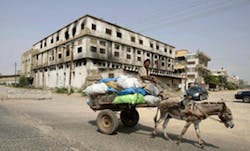Expert Testifies before Senate Foreign Relations Committee on Worker Safety in Bangladesh
In testimony June 6 before the Senate Foreign Relations Committee, international labor and employment expert Johan Lubbe focused on the key issues that the retail, apparel and manufacturing industries face when doing business in Bangladesh, as well as solutions that have been offered to address worker safety.
“It is important that everyone recognize the shared responsibility that is required for addressing the worker and factory safety issues,” said Lubbe in his testimony before the committee. “This responsibility lies with all stakeholders including the Bangladesh government, the U.S. and other foreign governments, factory owners, employer's organizations, workers, the buyers in North America and Europe, members of civil society and organized labor. The efforts should all build off of each other to achieve the ultimate goal of protecting those who work in the Bangladesh garment factories.”
Lubbe, a shareholder and U.S. practice co-chair for International Employment Law at Littler Mendelson P.C., is testifying on behalf of the American Apparel and Footwear Association (AAFA), the National Retail Federation (NRF), the Retail Industry Leaders Association (RILA) and the U.S. Association of Importers of Textiles and Apparel (USAITA). The associations, along with the Retail Council of Canada (RCC), the Canadian Apparel Federation (CAF) and an alliance of North American retailers, brands, manufacturers and industry associations, are working with the Bipartisan Policy Center (BPC) to solicit input from a wide-range of stakeholders in order to develop and implement a single, unified plan of action to improve worker safety in Bangladesh garment factories.
“Collaboration is an essential component of efforts to improve worker and factory safety in Bangladesh,” insisted Lubbe. “The joint efforts of all stakeholders are essential to identify viable solutions and implement a successful and sustainable plan of corrective action that addresses the system wide challenges in Bangladesh.”
Any solution must address eradicating corruption, improving the quality of building construction, positioning the location of factories, the issuing of building use permits, the enforcement of building and safety codes, the ability of garment workers to raise concerns free of retaliation an more, said Lubbe, who added: “While many would prefer a single coordinated effort, there should be flexibility to allow companies the ability to quickly deal with issues within their own supply chains."
Future effort by the coalition of retail industry groups will build upon work already underway the past several months to achieve effective and long-lasting change for the industry and its workers. Former U.S. Senators George Mitchell (D-ME) and Olympia Snowe (R-ME) have been asked by the alliance of retailers and brands to serve as independent facilitators for its discussions. Read more about this effort here: http://bit.ly/10QAv5X.
“Retailers, brands and manufacturers have come together in an alliance to develop a single, unified action plan that will achieve immediate, sustainable, effective and long-lasting change for the garment industry and its workers in Bangladesh,” Lubbe told the committee. “The action plan builds upon the extensive work already being conducted by many of these retailers on the ground today. These actions include a focus on worker training and empowerment, standards for fire and building safety assessments, sharing of factory inspection and training information, governance and funding."
About the Author

Sandy Smith
Sandy Smith is the former content director of EHS Today, and is currently the EHSQ content & community lead at Intelex Technologies Inc. She has written about occupational safety and health and environmental issues since 1990.
